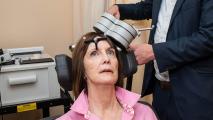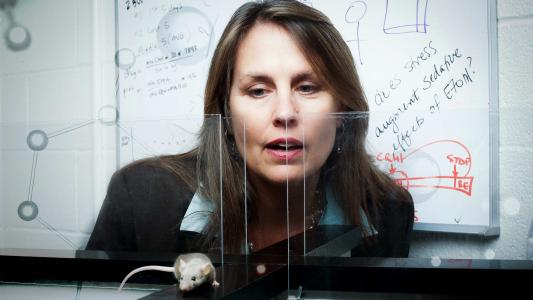“I’m having a very deathly week,” the young woman says, starting the conversation after a round of introductions. All 26 people sit in the dark room in the back of Washington D.C.’s The Potter’s House Cafe, encircling a single candle.
It isn’t the woman’s first time talking about death in a group setting. She has been to one of Nicole Heidbreder’s “death cafes” before. She says she came out of it feeling very heavy and drained. It called up emotions from her father’s death three years ago. Still, she felt compelled to attend a second time.
Heidbreder is a death doula. If her job title brings up creepy feelings, Heidbreder says it’s because Western culture, in general, doesn’t have a favorable perspective on death. But a death doula, officially called an end-of-life doula, helps individuals transition to the next phase of life. They are a growing part of the “death positive” movement — to get people talking about death and making the topic less taboo.
Dr. Sheldon Solomon, a social psychologist at Skidmore College, has spent 40 years researching the effects of death anxiety on human behavior.
“My general opinion is that death doulas and death cafes are a very welcome and necessary addition to our society, in particular because we’re the most blatantly death-denying culture perhaps in the history of Earth,” he says, adding that he believes that most people in America have never even seen a dead person.
According to Solomon, many human behaviors are motivated by our unique awareness of death and our reluctance to accept it. Behaviors like compulsive shopping, smoking, destroying nature, or dissatisfaction with our body are all influenced by our suppressed awareness of death. Solomon says these destructive behaviors are manifestations of death anxiety, and, he says, talking about death can reduce them.
“The death-positive enterprises slows down the wheel of death denial long enough for each of us to get on the path of life,” he says, echoing a common death doula sentiment that talking about death improves life.
Back at the death cafe, Heidbreder explains how she can’t give her clients the one thing she says they want most — more time. Even people in their 90s tell her they aren’t ready to go. But she says that talking about death will help people prepare. So, she lays the ground rules for the death cafe: it is a non-denominational event, without forced lecture, and it is free and open to anyone.
One by one, people begin to share. A teenager talks about losing his mother. A woman grapples with finding the body of her suicidal friend. An older man wonders if death is actually birth into real life. “We don’t know that isn’t true,” he says. “I find comfort in that.”
In addition to leading death cafes, Heidbreder focuses on death doula training and other forms of public education. Another event she regularly hosts is a death meditation, where she “guides you through the dissolution of the body and identity.” She says all this work normalizing a conversation around death is “a beautiful part of my legacy that I want to leave on the planet.”
It turns out, leaving a legacy behind is an essential part of dying well, and a death doula can help. Shelby Kirillin works with Heidbreder to train and certify death doulas through the International End of Life Doula Association (INEDA). One service she offers is to help the dying extrapolate significance from their life. She even helps them make a “legacy project” to document their life’s highest meaning.
Kirillin admits that, in her line of work, sadness comes with the territory. A death doula doesn’t provide medical care. However, they work with hospice and medical staff to provide emotional and practical support for the dying and their families. Kirillin offers services from providing conversation starters and suggesting activities to helping to arrange hospice and funeral services.
When people understand they are likely dying and call on Kirillin, she helps them talk about their final goals. She gets them ready to die. This preparation can help them avoid fruitless attempts to prolong life when their goals are better met doing other things, whether making amends or baking cookies with their grandkids. Despite the sadness, she says, “there is a consciousness about it. They aren’t grasping at straws.”
“The death-positive enterprises slows down the wheel of death denial long enough for each of us to get on the path of life.”
Dr. Sheldon Solomon, Social Psychologist at Skidmore College
Kirillin describes the opposite — the lack of consciousness — being people who lose sight of what is most important to them and make every attempt to prolong life when it comes at a great price.
“In our culture, we deny death is occurring. That has taken away the bounty with which it brings and the lessons with which death brings. When you understand that something is finite, it makes life so much more vivid and beautiful,” Kirillin says. “My job is to help them realize what they want to do in their final days.”
Kirillin knew she was in the right line of work when helping her very first client, a 70-year-old-woman. The husband contacted her because of the incredible pain his wife was enduring. The doctor had given him two options: rush her to the hospital or call hospice. Another round of meds wasn’t ideal and, to him, calling hospice was giving up. He called Kirillin instead.
“I just want my wife to see her garden again,” he told her.
Kirillin showed him how to bring his dying wife into the garden comfortably. In the final days, she generated conversation within the family. She helped the daughter climb into her mom’s bed for a last snuggle. It was Kirillin who opened the windows so she could smell her garden one last time, something everyone was too preoccupied to think of. When she died, her husband thanked Kirillin during the funeral service for making her final days unique.
“When you understand that something is finite, it makes life so much more vivid and beautiful.”
Shelby Kirillin, Founder and President of A Peaceful Passing
In Heidbreder’s death cafe, the atmosphere of the two-hour conversation is oddly upbeat, despite the pallid topic.
Like a game of telephone, a common sentiment moved through the room until one woman summed it up. “Recognizing death,” she says, “gives me a greater appreciation of life and encourages me to be present.”






